Diplomatic Bluebook 2019
Chapter 4
Japan's Diplomacy Open to the Public
2 Strengthening Foreign Policy Implementation Structure
The security environment surrounding Japan has become very severe and diplomatic issues are becoming increasingly challenging and diverse. Under these circumstances, it is vital to further strengthen Japan's foreign policy implementation structure, and MOFA is reinforcing its organization and personnel at headquarters and overseas missions, including Embassies and Consulates General.
Diplomatic missions overseas, such as Embassies and Consulates General, not only represent Japan and promote diplomatic agenda, but also play a key role in areas such as information gathering on the frontline and strategic communication with the public abroad. At the same time, overseas missions are also responsible for operations directly related to enhancing the interests of Japanese nationals, such as protecting their lives and safety, providing support for Japanese companies, promoting investment and tourism, and securing energy and other resources.
In January 2019, Japan established a new Embassy in Belarus, a Consulate-General in Davao (the Philippines), and a Delegation to the International Civil Aviation Organization (ICAO) in Montreal (Canada). As a result, the number of diplomatic missions overseas as of FY2018 is 226 (151 Embassies, 65 Consulates General and 10 Permanent Missions).
Belarus occupies a position of geopolitical importance as a country bordering the EU and Russia. Moreover, given that it was a country damaged by the Chernobyl Nuclear Accident, Japan has concluded the agreement on cooperation to advance aftermath response to accidents at nuclear power stations with Belarus, and the two countries share knowledge in the field.
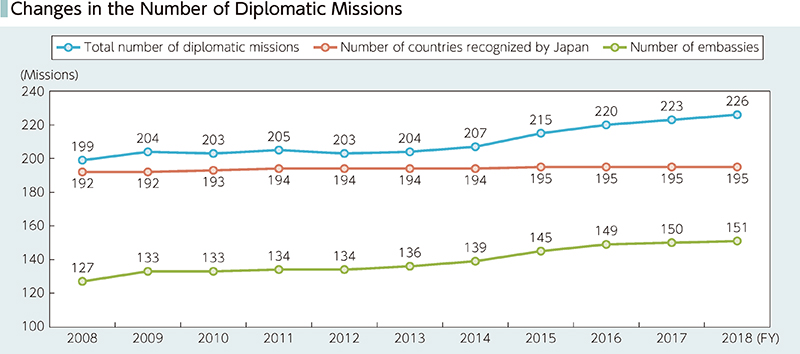
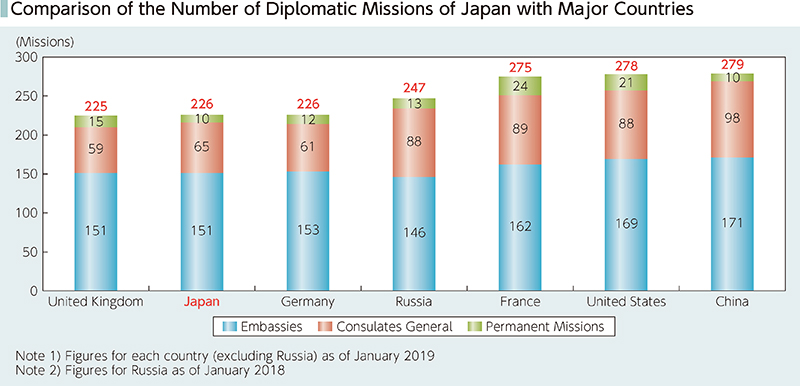
Davao, the Philippines, has produced President Duterte (former mayor of Davao), and the city carries growing political weight. Moreover, Mindanao with Davao at its center hosts many Japanese companies and Japanese national residents, and the need to support those Japanese businesses and nationals through a diplomatic mission is hightening. The region still harbors a destabilizing element of Islamic extremism and potential terrorist attacks thereof, thereby necessitating activities for information gathering and execution of preventive measures against terrorism.
ICAO is a specialized organization under the United Nations involved in ensuring the formulation and implementation of rules concerning international civil aviation, and is closely associated with aviation diplomacy and security. As events that greatly impact the security of Japan as well as civil aviation have occurred, including ballistic missile launches by North Korea and the designation of an air defense identification zone by the Chinese Government, Japan collects information via ICAO, while urging ICAO to take appropriate measures.
In addition to the establishment of these overseas missions, Japan established a Mission to the North Atlantic Treaty Organization (NATO) in July 2018. Japan has been conducting practical cooperation with NATO on maritime security, crisis management against cyberattacks and other threats, and in the field of international cooperation. It is also important from the perspective of contributing to peace and stability of the international community as a whole, as well as the maintenance of order through strengthening the alliance network among Japan, the U.S. and European countries.
A new embassy in Vanuatu will be established in FY2019. Vanuatu is a pro-Japanese country, and it is one of the geopolitically important countries in the Melanesian region for gathering and disseminating information. Through the opening of an embassy in the country, Japan seeks to elevate bilateral relations with Vanuatu to a higher level and strengthen cooperation in the international arena.
In addition to establishing more diplomatic missions overseas, it is important to secure and increase the number of staff members to support diplomacy at MOFA and diplomatic missions overseas. Despite the Government's policy to reduce the overall personnel expenses across all ministries in light of the current severe budget situation, the number of staff members at MOFA was increased to 6,173 (6,065 in 2017), in order to bolster safety measures, strengthen information gathering and analysis capabilities, vitalize the economy including infrastructure exports, advance strategic communications, and address global issues, etc. This number, however, remains insufficient in comparison with other major countries. MOFA continues its efforts to build a structure that commensurates with Japan's national power and diplomatic policy. In the meantime, as enhancing the foreign policy implementation structure remains necessary in FY2019, MOFA plans to increase its staff members by 115 in order to address important issues, such as greater information gathering and analysis capabilities, Japan's economic vitalization including increased infrastructure exports, stronger strategic communications, and addressing important agenda in security, bilateral relations and regional affairs.
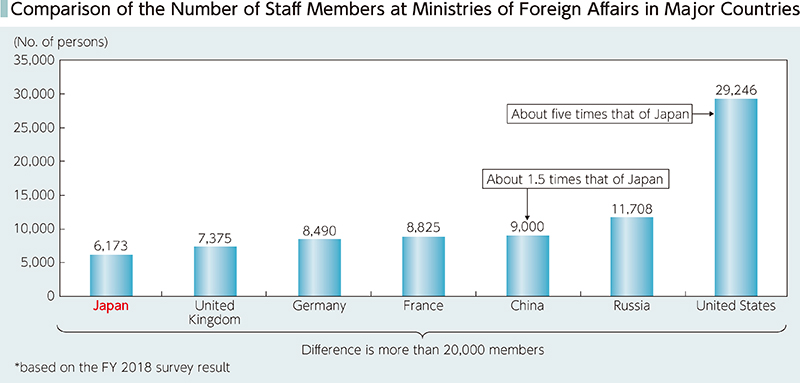
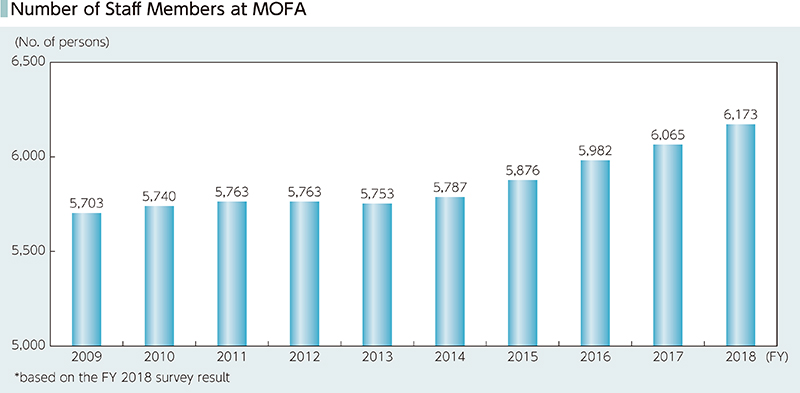
MOFA appropriated a budget of 696.7 billion yen in the budget for FY2018 (an increase of 4.1 billion yen from FY2017) to take on an even more proactive role in diplomacy to lead international initiatives and discussions. The total amount of MOFA's FY2018 supplementary budget was 149.6 billion yen for matters of an urgent nature such as assistance on global issues, including epidemic diseases, humanitarian, counter-terrorism or social stabilization assistance including refugee issues.
MOFA's FY2019 initial government budget proposal appropriated 730.6 billion yen based on the following priorities: (1) further enhancing Japan's presence and influence through international events held in Japan; (2) bolstering of diplomatic capabilities for Japan's national interests and peace and prosperity in the international community; (3) striving to nurture a deeper understanding and appreciation of the variety of charms Japan has to offer, including a true understanding of the country's nature, through the implementing of strategic communication; and (4) protecting Japanese nationals abroad and in Japan from threats such as terrorism. To respond to the increasing need for diplomacy, the budget was expanded for use of the Foreign Minister's chartered plane and to ensure the recruitment of high quality chefs for Ambassadors/Consuls-General of Japan, while also appropriating an increased ODA budget to achieve a “Free and Open Indo-Pacific.”
In order to promote Japan's national interests, it is essential to strengthen the foreign policy implementation structure. Japan will continue to proceed strategically to further expand the foreign policy implementation structure while making efforts to streamline operations.
What impression do you have of work at the Ministry of Foreign Affairs (MOFA)? You might have a glamorous image, but some might also envision extremely busy people. Work at MOFA does in fact involve interaction with foreign countries with different perspectives and stances to Japan. It also requires dealing swiftly with emergency situations. As globalization progresses, diplomatic challenges have diversified, and the areas that the officials of MOFA deal with have become broader and more specialized. In general, the workload at MOFA has increased.
In these circumstances, MOFA is working on streamlining and reforming its operations to develop an environment in which its staff can fully demonstrate their ability and focus on formulating foreign policy.
Since his inauguration, Foreign Minister Kono has been proactively visiting foreign countries and developing a relationship of mutual trust with counterpart countries. Simultaneously, in order to continue carrying out an increasing number of foreign visits, MOFA has reviewed the support tasks for the Minister's official trip preparation and coordination, and lowered the number of staff necessary for the task by 40%. In addition, part of the work related to ministerial meetings to be held in Japan has been entrusted to private companies, thereby reducing the number of staff that need to be mobilized for the work, and cultivating an overall work environment that allows all staff members to concentrate on their original area of responsibility.
In consular affairs, a service directly connected to the public, MOFA is working to improve and streamline its services through the use of IT technology. For example, the integration of the consular connection systems implemented in March has enabled the sending out of safety information swiftly to Japanese tourists abroad and Japanese nationals overseas. MOFA is also studying the introduction of electronic applications for passports and e-visas, as well as credit card payment systems for the fees for these services.
Furthermore, in order to develop an empowering environment for a diverse workforce, MOFA is trying to carry out work style reform. About 30% of the staff currently working in MOFA are women, and many staff members are part of a dual-career family. Through the development of teleworking (work-from-home) and a flex time system, as well as the provision of seminars and training, efforts are being made to change employees' mindset so that the employees of both genders with parenting or nursing care responsibilities can maintain a good balance between work and private life.
MOFA will continue to work on streamlining and improving operations so that we can create a work environment where “humans,” the greatest asset of diplomacy, can be vibrant and active, in order to provide appropriate services to the public.
Noriko Kitamura
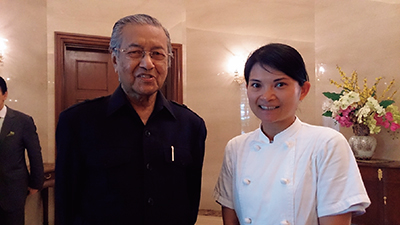 Photograph of Prime Minister Mahathir and the author
Photograph of Prime Minister Mahathir and the authorAs the Executive Chef for the Ambassador of Japan in Malaysia, I have been preparing meals at the official residence of Ambassador Miyagawa since March 2014. One of the most important jobs of an Executive Chef is to manage the lunch and dinner banquets hosted by the Ambassador for VIPs of Malaysia invited to the official residence. These range from small-scale events for about five to six people, to large-scale events for about 20 people. The guests visit the official residence with high expectation of delicious Japanese cuisine.
Malaysia is a multiethnic country with mainly Malay, Chinese, and Indian citizens. It is forbidden for Muslims to have alcohol and pork, and for Indians of the Hindu faith to have beef. These guests often attend the same dinner banquets, and with the further addition of vegetarian guests, planning the menu requires great effort.
The Executive Chefs for Ambassadors/Consul-Generals of Japan carry out the menu planning, purchasing of ingredients, preparation, and cooking all by themselves. Preparing food mechanically results in cold and unimpressive dishes. So I try to obtain as much information as I can about the guests beforehand and building upon that research, strive to subtly incorporate the favorite items of the guests, local foods, and specialties into the courses of the meal. The more information that I collect, the more greatly my imagination about the guests develops. I am encouraged and motivated to cook while imagining the moment when the guests express their surprise and pleasure.
I have also had opportunities to prepare and serve food to VIPs whom we rarely get a chance to encounter. Perhaps I should say that this is one of the advantages of working as an Executive Chef for an Ambassador/Consul-General of Japan. In the past, I have been blessed with opportunities to prepare food for Prime Minister Mahathir of Malaysia, and guests from Japan including His Imperial Highness the Crown Prince, the Foreign Minister, and the Minister of Land, Infrastructure, Transport and Tourism. Planning the menus for VIPs is always a difficult task, but I have ultimately reached the conclusion that instead of serving eccentric and newfangled dishes, I can only put all my heart into preparing the dishes that are usually served to guests. In any case, it is an invaluable experience for a chef to have been able to prepare food for such dignitaries.
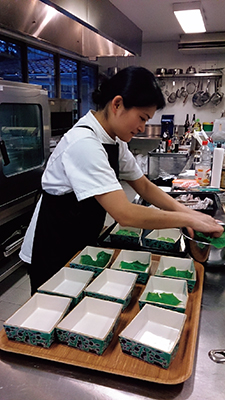
I also served as the Executive Chef to Ambassador Miyagawa when he was posted to Geneva from 2007 to 2009 as the Deputy Permanent Representative of Japan to the Permanent Mission of Japan to the International Organizations in Geneva and Consul-General of Japan in Geneva. In Geneva, I learned about the virtues of Western food culture such as French cuisine and Italian cuisine. Likewise in Malaysia, I became well-acquainted with Eastern food culture, and broadened my repertoire as a chef. For an Executive Chef of an Ambassador/Consul-General of Japan, in addition to gaining knowledge about food, having the opportunity to learn other languages, gain exposure to different cultures, and broaden our horizons is also an appealing aspect of the job. These experiences will enrich our lives for the future.
In Malaysia, people are very familiar with Japanese cuisine, and would give examples such as sushi, tempura, and teppanyaki when asked about Japanese food. However, there are not yet any restaurants serving authentic “kaiseki” meals (traditional ceremonial dishes). I hope that there will be an authentic Japanese restaurant in Malaysia someday, as the people of Malaysia are eager to savor authentic and delicious Japanese cuisine.


